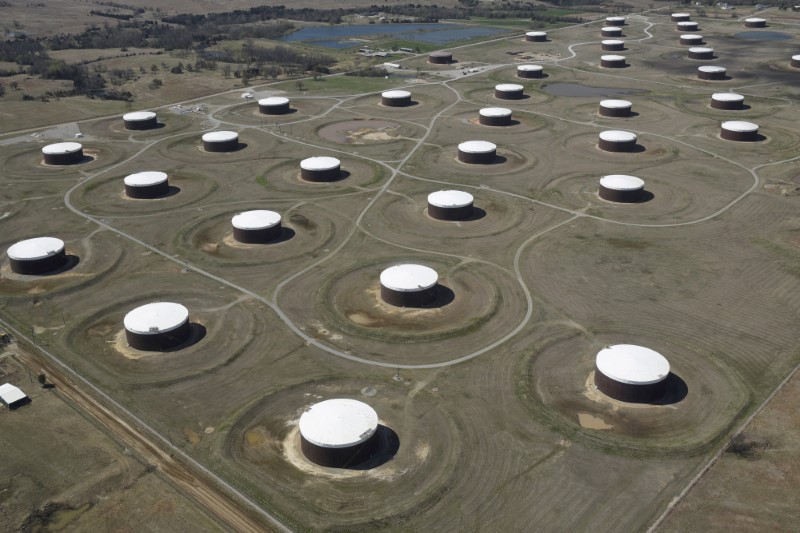By Saqib Iqbal Ahmed
NEW YORK (Reuters) - U.S. crude oil futures fell on Monday but gasoline prices surged to 2-year highs as Tropical Storm Harvey kept hammering the U.S. Gulf Coast, knocking out several refineries, which backed up crude supplies and disrupted fuel production.
The U.S. dollar dropped to its lowest in roughly 16 months against a basket of major currencies and a more than 2-1/2-year low against the euro, following comments from central bankers on Friday and worries over the storm hurting the U.S. economy.
Harvey made landfall in Texas late on Friday as the most powerful hurricane to hit the region in more than 50 years and caused large-scale flooding, forcing refineries in the area to close.
U.S. crude futures fell as the refinery shutdowns could reduce demand for American crude.
"The reduced inputs to those Gulf refineries will result in an increase in crude inventories," said Tony Headrick, energy market analyst at CHS Hedging.
"That outweighs the outages in crude oil production from the storm."
U.S. crude (CLc1) settled down $1.30, or 2.7 percent, at $46.57 a barrel.
The refinery shutdowns sent U.S. gasoline prices soaring. Spot prices for U.S. gasoline futures (RBc1) surged 7 percent to a peak of $1.7799 per gallon, before easing to $1.7233.
In the U.S. equity market, energy and bank shares weighed on the Dow and the S&P 500.
"There tends to be initially a knee-jerk reaction and people react to the human side and the energy disruption but that eases soon," said Jim Paulsen, chief investment strategist at The Leuthold Group in Minneapolis.
"This is a massive human tragedy and the worst of it may not be over yet, but as far as stock market impact I don’t know if it is net-net a huge negative considering the fact it will bring in huge stimulus to the region," he said.
The Dow Jones Industrial Average (DJI) fell 5.27 points, or 0.02 percent, to finish at 21,808.4, the S&P 500 (SPX) gained 1.19 points, or 0.05 percent, to end at 2,444.24 and the Nasdaq Composite (IXIC) added 17.37 points, or 0.28 percent, to close at 6,283.02.
European shares fell as the euro strengthened after European Central Bank chief Mario Draghi did not express concern about a strong currency in a closely watched speech.
MSCI's world index (MIWD00000PUS), which tracks shares in 46 countries, rose fractionally.
The U.S. dollar extended its weakness from last week.
"The disappointment from (U.S. Federal Reserve Chair Janet) Yellen at Jackson Hole on Friday has carried over to trading this week," said Kathy Lien, managing director at BK Asset Management in New York.
Yellen did not address monetary policy at a summit of central bankers in Wyoming. The impact of Harvey was also weighing slightly on the greenback, Lien added.
The dollar index (DXY), which tracks the greenback against six major currencies, was down 0.52 percent at 92.261, after falling to 92.184, its lowest since May 2016.
U.S. benchmark Treasury yields fell to two-month lows after strong demand for a five-year note auction and as market participants waited on U.S. economic data that will culminate on Friday with the August employment report.
Benchmark 10-year notes (US10YT=RR) gained 5/32 in price to yield 2.155 percent.

The weaker dollar helped gold <XAU=> rise to a more than nine-month high.